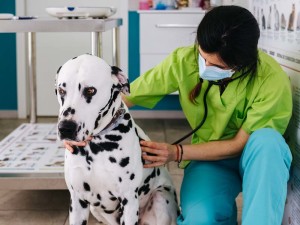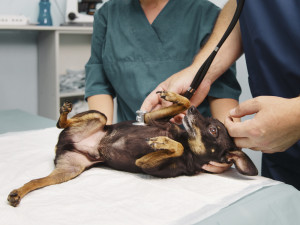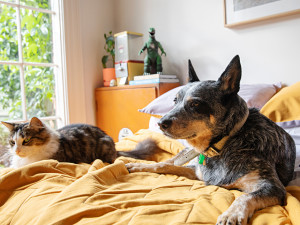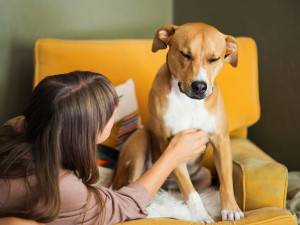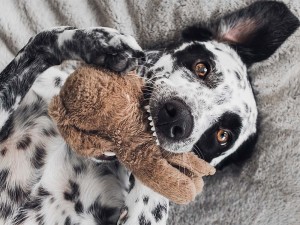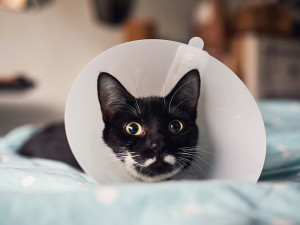Here’s How You Can Prevent Dangerous Bloat in Your Dog
Bloat is one of the leading causes of death in deep-chested dogs. This elective surgery can lower the risk.
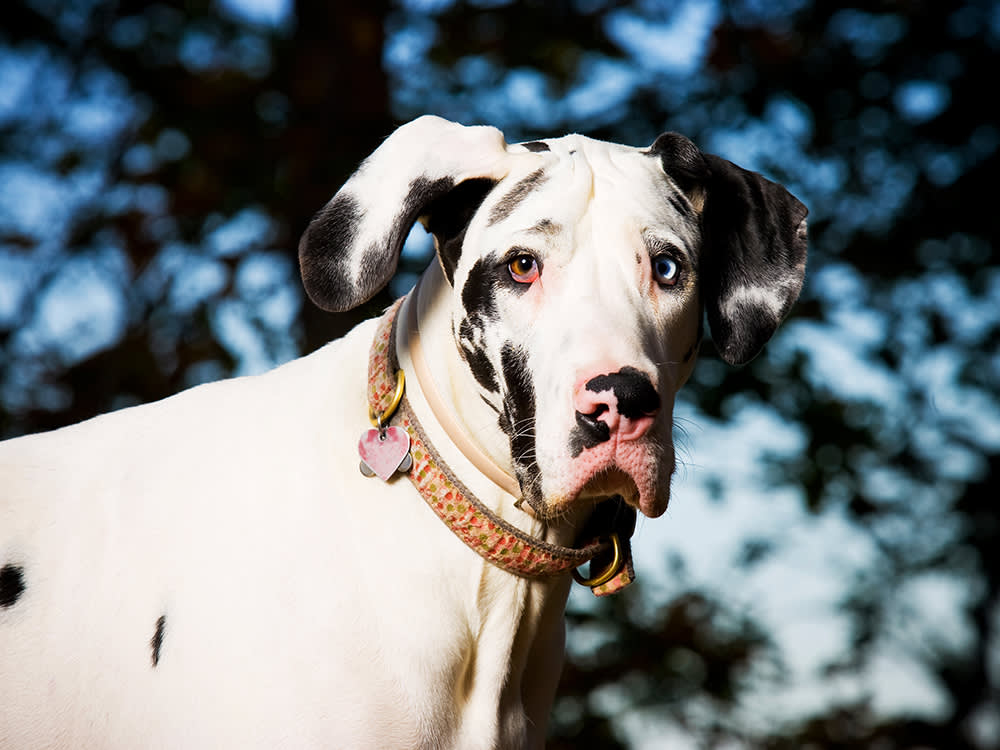
share article

Your pet wants you to read our newsletter. (Then give them a treat.)
As humans, we experience bloat after an especially indulgent meal. Besides unbuttoning that top button on our pants and taking an antacid, all we need to do is wait until we feel less like Violet Beauregarde when Willy Wonka blows her up like a blueberry.
But bloat in dogs is more often a very serious issue. The last thing any pet parent wants to think about is gastric dilatation and volvulus (GDV), commonly known as bloatopens in a new tab. For those with deep-chested dogs — including Great Danes, Labradors, and Weimaraners — it’s a fear that’s always lurking.
What exactly is bloat?
GDV is quickly fatal and one of the leading causes of death in dogs of these breeds. During an episode of bloat, a dog’s stomach dilates and fills with air or fluid. Occasionally, the condition stops there, but it often progresses into volvulus, full GDV. During this stage, the stomach twists upon itself. Bloat can kill a dog within hours if not treated immediately. The treatment for bloat is called a gastropexy.
So, what is a gastropexy?
During this surgical procedure, a veterinarian will suture your dog’s stomach to the wall of the body to prevent twisting. Prior to applying the suture, the veterinarian will untwist the stomach, returning it to its normal position. A gastropexy is most commonly performed as an emergency surgery in response to an episode of bloat, you do have the option of preventative surgery, called prophylactic gastropexy, to prevent a future episode. Often, veterinarians will perform a prophylactic gastropexy at the time they spay or neuter a dog. For dogs who have already been altered, a laparoscopic option is available which is minimally invasive with only small incisions made. With a laparoscopic gastropexy, only minor complications have occurred — most commonly a temporary skin fold.
Does a gastropexy work?
While the gastropexy is not effective at preventing bloat of the stomach (filling up with gas), it does prevent the life-threatening twisting of the stomach. And that’s a good thing. But Dr. Michael Willardopens in a new tab, professor at Texas A&M University College of Veterinary Medicine & Biomedical Sciences adds an important caveat: “Prophylactic gastropexy may greatly lessen the risk of recurrence, but it does not completely eliminate it.”
So, how much does preventative gastropexy lessen the risk? It can decrease the rate of recurrenceopens in a new tab from 55 percent to four percent. When it comes to determining if a prophylactic gastropexy is a good solution for your dog, your first stop should be your veterinarian. Talk with your vet about your concerns. They can help review your dog’s health and the potential occurrence and risk factors with you.
Which dogs are most at risk for bloat?
Large-breed dogs have a 24 percent chance at developing GDV, and that risk increases with age. Dog breeds predisposed to bloat include Great Danes, St. Bernards, Weimaraners, Rottweilers, Irish Setters, Gordon Setters, Boxers, Standard Poodles, Basset Hounds, Doberman Pinschers, German Shepherds, Bloodhounds, Newfoundlands, and Old English Sheepdogs.
Willard estimates the average cost of treating a GDV case with surgery to be between $2,000 and $5,000, but if there are complications, the cost could be much higher. Beyond the general risk of surgery and anesthesia, gastropexy is generally well tolerated by most dogs, though some dogs have experienced gastrointestinal issues.
If you’re thinking about getting a gastropexy for your dog, seek an experienced veterinarian surgeon. Remember: If bloating of the stomach occurs in your dog, seek out veterinary attention immediately regardless of if your dog has had a gastropexy. It could save your pup’s life.

Daniela Lopez
Daniela Lopez is a digital media specialist and long-time contributor to The Bark.
Related articles
![A pet parent checks their dog's stomach.]() opens in a new tab
opens in a new tabDIY Physical Exam Part 4 — How to Examine Your Dog’s Stomach and Skeleton
Veterinarian Dr. Shea Cox on how to properly examine your dog’s stomach and musculoskeletal system.
![Dalmatian mix breed dog is playing with a dog toy on a soft surface]() opens in a new tab
opens in a new tabDigging into the Fine Print of Pet Insurance
Risk Management: Understanding pet insurance plans.
![Black cat with white spots on its fur laying on a light blue blanket while wearing a con around its head]() opens in a new tab
opens in a new tabBe Prepared: Four Pet Emergency Room Essentials for Pet Parents
Lay the groundwork for quick, low-stress treatment.
